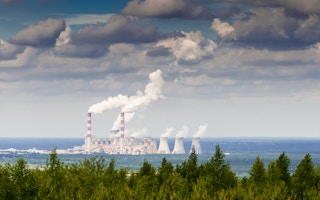The 10 European countries with the highest rates of climate-changing emissions from energy use are spending around 6.3 billion euros ($6.89 billion) year on coal subsidies, money that could instead be invested in energy technologies of the future, researchers said on Monday.
Those countries - from Britain to Spain - produce 84 per cent of the European Union’s energy-related greenhouse gas emissions, with Germany and Poland the largest emitters.
“Governments have often used the energy transition, including a shift to renewables, as a justification for extending and introducing new subsidies to coal,” the researchers said in a report published on Monday.
Part of the reasoning is that “when the wind doesn’t blow and the sun doesn’t shine, you need power on stand-by to provide the grid”, said Shelagh Whitley, a co-author of the report and head of the climate and energy programme at the Overseas Development Institute (ODI), a London-based think tank.
“
We know that renewables are more intermittent. But we need an (electricity) grid and systems within people’s homes and businesses that can manage that - and the technology exists.
Shelagh Whitley, head, climate and energy programme, Overseas Development Institute
“Instead of governments supporting technologies which are part of the future energy system … they’re subsidising centuries-old technology,” she said.
A better use of the funds could be investment in new technologies such as batteries to store renewable power, as well improvements in energy efficiency and installing demand systems in factories and businesses that can help them power up or power down in times of high demand or low supply.
“We know that renewables are more intermittent,” Whitley told the Thomson Reuters Foundation. But “we need an (electricity) grid and systems within people’s homes and businesses that can manage that - and the technology exists”.
Smart technologies can be installed that allow factories, for example, to turn down their refrigeration units when the energy grid has less capacity - and get paid for that in the same way people are paid to supply energy from their solar panels, she said.
Reducing coal use would also have health benefits, the report said. About 23,000 early deaths every year are linked to coal burning - 10,000 of them in Poland and Germany, ODI said.
The European Commission has repeatedly urged member states to phase out environmentally harmful subsidies by 2020, including those for fossil fuels.
In some countries - including Germany - subsidies for renewable energy are significantly higher than those for coal, ODI noted.
European countries are among the first big nations to try to switch away from fossil fuels as part of a global attempt to keep global warming to well below 2 degrees Celsius, under the Paris climate agreement.
Others countries - including heavily coal-dependent developing countries - will be watching their experiences, and the costs involved, Whitley said.
Right now, “we very much focus on the clean and green and renewables, and not about how we get off the fossil fuels”, she said.
“It’s really about getting to the bottom of what are the resources needed and who should be paying for this - should it be taxpayers or the private sector?” she said.
The problem is that without a good look at how to do things differently, “we’re seeing a lock-in and an extension of coal in a way that makes it harder for countries to meet the pledges (to phase out coal)”, she said.
The countries studied were: Britain, France, Czech Republic, Germany, Greece, Italy, Hungary, Netherlands, Poland and Spain.
($1 = 0.9142 euros)
This story was published with permission from Thomson Reuters Foundation, the charitable arm of Thomson Reuters, that covers humanitarian news, climate change, resilience, women’s rights, trafficking and property rights. Visit http://news.trust.org/climate)

















